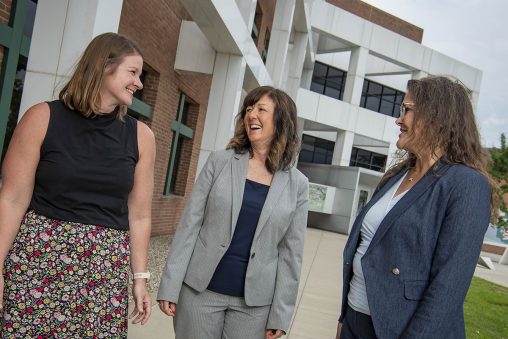
From left: Nicole Kinzeler, assistant professor in the Department of Population and Public Health Sciences; Barb Marsh, director of Counseling and Wellness Services; and Jennifer Hughes, chair of the Department of Social Work and interim chair of the Department of Human Services, will lead a federally funded project to provide mental health services children, adolescents and young adults in rural and medically underserved areas. (Photo by Erin Pence)
A $2.4 million grant has allowed one of the largest universities in the Dayton area to not only provide students with hands-on career experience but also support underserved Ohio communities in need of accessible mental health programming.
Wright State University graduate students studying social work and counseling will help address the growing demand for mental health services in underserved communities through a new initiative aimed at expanding the region’s behavioral health workforce.
Deemed the Wright State’s Workforce Wellbeing Initiative, the program will place 12 master’s-level interns with partner organizations each year for four years, allowing students to participate in clinical internships serving children, adolescents and young adults in rural and medically underserved areas.
It was developed by Wright State’s College of Health, Education and Human Services in partnership with Counseling and Wellness Services, and the program will officially start in the fall of 2025.
“The purpose of the program is to increase the number of professionally trained behavioral health providers in the Greater Dayton area,” said Barb Marsh, director of counseling and wellness services at Wright State. “We will achieve this goal by expanding on-site internships for students in our behavioral health degree programs. This initiative will increase access to behavioral health services in currently underserved communities.”
Partner agencies collaborating with Wright State to support the grant and student placements include the Greater Dayton Area Hospital Association, Dayton Children’s Hospital, Five Rivers Health Centers, Kettering Behavioral Health and Rocking Horse Community Health Center. The partners were chosen due to Wright State’s long-standing relationships with regional behavioral health providers and their capacity to offer high-quality, diverse clinical training sites.
“These opportunities will allow our students to complete their degrees while gaining meaningful, real-world experience with our community partners,” Jennifer Hughes, professor and chair of the Department of Social Work, interim chair of the Department of Human Services and the initiative’s principal investigator, said. “By providing these essential supports, we are equipping students to succeed academically, grow in confidence and pursue impactful careers serving high-need populations after graduation.”
The program is supported by a four-year, $2.4 million grant from the Health Resources and Services Administration, which is set to conclude in June 2029. Wright State and its partners are actively seeking federal, state and local funding to ensure the program’s continuation beyond the initial grant period.
These internships not only provide students with hands-on career experience but also address the urgent need for mental health services and accessibility in Ohio.
The Ohio Department of Mental Health and Addiction Services reports that more than 2.4 million Ohioans lack access to mental health and behavioral care services in the state. With approximately four out of every 10 Ohioans living with a behavioral health disorder, the demand for services has increased by more than 350%.
According to Nicole Kinzeler, assistant professor in the Department of Population and Public Health Sciences and assistant director of the Substance Abuse Resources and Disability Issues Program in Wright State’s Boonshoft School of Medicine, the state currently meets just 30% of its mental health care needs based on population, making it one of the states with the highest provider shortages. This shortage has led to critically high rates of suicide — including youth suicide — and unintentional drug overdoses, as reported in 2022.
Through the program, Wright State students’ work will help address this shortage in key demographic areas across the Dayton region and ultimately expand the region’s behavioral health workforce.

 Walking through open doors
Walking through open doors  Adventures await
Adventures await  Wright State to expand nursing facilities to meet workforce needs and prepare more graduates for in-demand careers
Wright State to expand nursing facilities to meet workforce needs and prepare more graduates for in-demand careers  Wright State student-athletes make a lasting impact on local family with more to come
Wright State student-athletes make a lasting impact on local family with more to come  Wright State names Rajneesh Suri dean of Raj Soin College of Business
Wright State names Rajneesh Suri dean of Raj Soin College of Business 